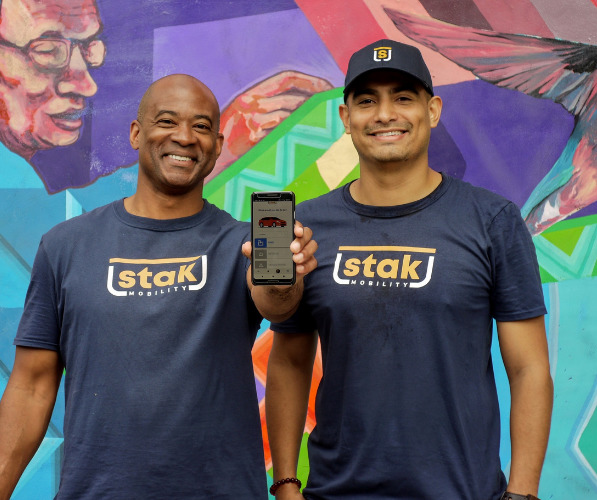Success Story
Penn State Alumnus Introduces Revolutionary Urban Mobility and Scalable EV Charging Experience
With 260 million vehicles in the United States, 85% of commuters driving to work, and a projected 85% of the population living in urban areas by 2030, limited parking and traffic congestion in US cities is a continuously growing problem. Local and state governments are also setting more aggressive goals to transition to electric vehicles (EV) to reduce carbon emissions. Some car manufacturers have committed to a complete transition to electric vehicles by as early as 2030. However, the infrastructure needed to support charging EVs in congested cities and for the mass transition of vehicle fleets doesn’t yet exist.
Penn State alumnus Diallo Powell is solving this challenge with Stak Mobility — an automated vertical carousel for fleet management, vehicle storage and EV charging that drivers and management can interact with through their mobile user experience and customer relationship management (CRM) apps. Using the app, a city-driver can find and reserve parking, pull into a spot, plug in (in the case of EVs) and press park. After the driver exits the vehicle, the car gets physically lifted into the vertical parking carousel. When a driver is ready to go, they can pay, retrieve and go. The CRM is used to track and manage vehicle parking, EV charging and payment.
The carousel model increases parking capacity by up to 700% and each parking pallet has a built-in EV charging station, which Powell and his team say is the most exciting feature of their product.
https://www.youtube.com/watch?v=3m8h_t8ZduU
“Not only do we have this space saving technology, but with the major push toward electric vehicles, we can address the major lack of scalable infrastructure to do it,” Powell said. “Most people in NYC parallel park on the side of the street. So how do you scale EV charging infrastructure in that environment? Our idea is to create Stak Mobility hubs in these densely populated areas.”
At Penn State, Powell studied Labor and Industrial Relations and was on the Penn State D1 lacrosse team. He said in studying the history of business and industry in the United States, he was intrigued by the large role technology has played in our nation’s history, and how big of an impact businesses and technological advancements have on the world.
Powell added that being a student athlete at Penn State contributed to his ability to work as part of a team as an entrepreneur and make the most out of any role that he’s given.
“It would’ve been incredible if Invent Penn State was here when I was,” Powell said. “It’s incredible. If something like that was here when I was, it would’ve created an amazing entrepreneurial experience for me, and I’m happy that it’s available for students now.”
His first few jobs out of college included working for the consulting firms Cap Gemini, Ernst & Young and Deloitte Consulting focused on the health insurance industry, where he learned foundational business skills.
He then spent several years running a division of professional services for a software company in New York.
“I started looking around for an opportunity, something different and more unique, and I came across a group that wanted to start a social purpose health insurance company,” says Powell. “I took a leap of faith and joined the founding team. I learned about what it takes to be an entrepreneur and was exposed to a few people who were very influential for me to take my career in that direction.”
While working as the GM/CIO for the parent and health insurance companies, the Affordable Care Act (ACA) became law. The CEO of the company appointed Powell to lead the launch of additional nonprofit health insurance companies on Exchanges in three states. An Exchange is another term for a Health Insurance Marketplace and is a service available in every state that helps individuals, families, and small businesses shop for and enroll in affordable medical insurance.
“It was a pretty incredible experience — working on building and launching three companies simultaneously in just 18 months,” says Powell. “When we launched, there was a lot of uncertainty and a change in paradigm for the health insurance industry with the introduction of the Exchanges. It felt like there was an opportunity in the industry for something new.”
Experiencing the shifting health insurance landscape led Powell to co-found Zipari, which offers an enterprise suite of consumer-facing healthcare applications with fully integrated CRM capabilities. Zipari was acquired in 2020 by a private equity firm and Powell began searching for his next entrepreneurial challenge.
Intrigued by the mobile space and property-based technology (PropTech), he began working on software for hotel resorts to enable guests to order services utilizing the phone’s GPS location services. Powell and his team had launched the product with a resort in Mexico when someone suggested he apply the same foundational concept to the vehicle parking space.
“For us, the Internet of Things (IoT) component was really cool. As we dug more into the parking idea, the possibility of combining mobility with industrial infrastructure was more and more compelling,” says Powell. “Now, my co-founder, Santiago Rios, and I have come together, created the Stak brand, partnered with groups to produce machinery, combined it with our mobile software, and we’ve built a pretty cool user experience. All entrepreneurs like a challenge, and we were most excited by just the question of, can we do this?”
Today, Stak Mobility’s pilot site is operating in a parking garage in Queens, New York. Stak Mobility is currently in negotiations to take over the garage so drivers can have the full end-to-end Stak experience, from reserving the spot, to parking their car, to retrieving their car and paying for parking, all on their phone. Stak Mobility is also in talks with a Fortune 100 company to offer a more efficient use of their real estate assets and looking to expand throughout major cities, with a focus on regions with aggressive EV goals, such as New York and the west coast.
“Nothing ever happens in the timeline that an entrepreneur has in their head, and so you’ve got to be patient and understand things may not go exactly the way you see them going,” Powell said. “It is essential to both have a really strong vision and be able to go with the flow, and it can be tough to strike that balance.”
Invent Penn State is a Commonwealth-wide initiative to spur economic development, job creation and student career success. Learn more.
To view more Penn State-affiliated startups, visit StartupNavigator.psu.edu. Entrepreneurs seeking resources can visit ResourceNavigator.psu.edu.






